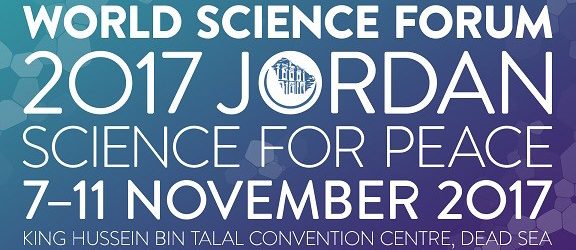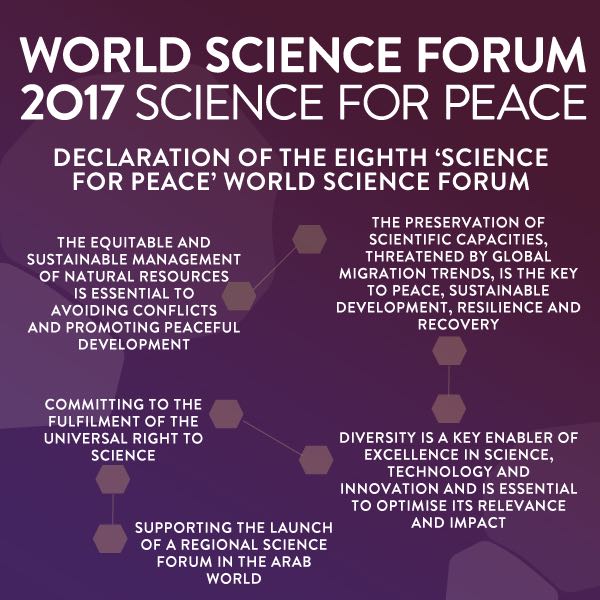
Dead Sea, Jordan: The World Science Forum, the world’s largest biennial science event on global science policy, was held from Nov 7-11, 2017 at the Dead Sea in Hashmite Kingdom of Jordan. Speaking from the lowest point on earth, leaders – Kings, Presidents, Princesses and Ministers – appealed to the loftiest and highest aspirations of human existence and called for the nations of the world to work with the scientific community to address the challenges confronted by Mankind today.
This year’s edition of the World Science Forum was held under the banner of ‘Science for Peace’ – a theme that may have appeared out of place only a decade ago but not in present times and certainly not in the Middle East which, today, is again one of the most volatile regions of the world and stands at a crossroads. Nobody could ignore the irony of what had happened just over the preceding weekend as the bitter rivalry between Saudi Arabia and Iran promised to throw the region into yet another conflict, this time in the neighboring Lebanon.
The regional context notwithstanding, this was the first and the largest ever gathering of science policy makers in the Middle East, in particular, and the Islamic World, in general, and Jordan could be immensely proud of its achievement to accord science, often neglected in the region, with the status at the center stage that it did, albeit only for a short period of a week.
The WSF 2017 was held under the patronage of HRH King Abdullah ibn Al Hussein of Jordan and HRH Princess Sumaya bint El Hassan, Chair of WSF 2017 and President of the Royal Scientific Society. Welcoming the audience to the event King Abdullah expressed his hope that Jordan will act as an accelerator of global scientific collaboration, opportunity, and peace.
The focus of the four day Forum was on global issues like water scarcity, food security, energy and the right to education. Participants emphasized that science plays a vital role in creating equality and provides opportunities for growth. A partnership on Research and Innovation in the Mediterranean Area (PRIMA) was also initiated to promote research and development in water availability and sustainable food production.
 The event’s opening ceremony was marked by the entrance of “Pepper” the first humanoid robot in Jordan. The robot rolled on the stage accompanied by the Japanese-American physicist and futurist Michio Kaku. Speaking to the audience it announced its plans to stay in Jordan where it would be working with a team of students in the field of robotics, hardware and programming at the Princess Sumaya University for Technology. Later in the evening, Professor Michio Kaku, a keynote speaker at the event, declared that science is the engine of prosperity and called for all nations to capitalize on its remarkable benefits.
The event’s opening ceremony was marked by the entrance of “Pepper” the first humanoid robot in Jordan. The robot rolled on the stage accompanied by the Japanese-American physicist and futurist Michio Kaku. Speaking to the audience it announced its plans to stay in Jordan where it would be working with a team of students in the field of robotics, hardware and programming at the Princess Sumaya University for Technology. Later in the evening, Professor Michio Kaku, a keynote speaker at the event, declared that science is the engine of prosperity and called for all nations to capitalize on its remarkable benefits.
A plenary session was also held on ‘The opportunity and Challenges of Digital Transformation’. Damon Horowitz a philosophy professor and serial entrepreneur stressed on the need to devise innovative approaches to problem solving. He remarked, “We cannot solve the problems of today with the same mindset we had when we created them”. Abier Amarin Director CRDF Global MENA emphasized on the need to build a trust relationship between policy makers and young scientists. The forum also featured a panel discussion on cross disciplinary areas of science.
A number of international science organizations, the United Nations Educational, Scientific and Cultural Organization (UNESCO), Organization for Economic Co-operation and Development (OECD), International Council for Science (ICSU), World Academy of Sciences (TWAS) and the Hungarian Academy of Sciences, also featured at the Conference and organized several sessions.
One of these side events was also a Meeting of the Task Force on the Culture of Science in the Muslim World – an initiative of the Muslim World Science – that brought together 12 leading scholars from around the Muslim World into a two-day huddle to discuss ideas and issues that form the culture of science in the Muslim World.
The Task Force is being chaired by HRH Princess Sumaya bint El Hassan and was convened by Prof. Nidhal Guessoum, Professor of Physics and Astronomy at American University of Sharjah and co-Convened by Dr. Moneef Zou’bi, Director General, Islamic World Academy of Sciences. Its members included, Dr. Muhammad Sabieh Anwar Associate Professor of physics at Lahore University of Management Sciences Pakistan, Dr. Athar Osama member of the Planning Commission, Government of Pakistan and also the Founder and CEO of Pakistan Innovation Foundation, Dr Dato’ Ir. Lee Yee Cheong, Honorary Chairman, International Science, Technology and Innovation Centre, Dr. Rana Dajani, Associate Professor at Hashemite University, Mohammed Yahia, the Executive Editor at Nature Middle East and President of World Federation of Science Journalists, Professor Jelel Ezzine Founding Chair Holder of UNESCO Chair on Science, Technology, and Innovation Policy, among various other eminent scholars, thinkers, practitioners, and science communicators from Jordan, Algeria, Tunisia, Indonesia, Malaysia, Egypt, and Lebanon. Participants discussed the reasons why a culture of science has failed to flourish in the Muslim world.
Speaking at the event Dr. Rana Dajani remarked that, “In the Muslim World, we always want quick results. We need to have a long-term view and need to strategize and implement initiatives to encourage scientific and critical thinking.”
Other task force members opined that there is a dire need of science communicators in the region who could communicate science related topics. Dr. Sabieh Anwar a proponent of quality science education in Pakistan heads an initiative that aims to develop and strengthen the science culture in Lahore’s educational institutions. He explained how his association that organized around 200 events used social media to market and promote the popular image of scientific content and method. He also shed light on the modern scientific edifice remarking that “a bulk of modern day scientific endeavors are translational”. Other speakers noted that despite rapid global advancements in the field of science, a scientific culture has failed to take root in the Muslim world. Dr. Moneef Zou’bi, Director General, Islamic World Academy of Sciences (IAS) revealed that “few universities in Muslim countries have a department of science and technology studies”. He pointed out that the IAS is committed to promoting scientific and inquiry based education in these schools and universities.
Closing Declaration from the World Science Forum 2017
At the concluding session of the World Science Forum 2017 participants issued a global call to action for science and society to facilitate the role of science in addressing global challenges through science and evidence-informed policy. Members adopted a unanimous declaration in which they pledged to make sustained efforts to preserve and promote scientific capacities and harness the potential of science, technology and innovation to promote equal opportunity based sustainable and peaceful development. Partner organizations, scientists and decision makers offered their support and commitment for the launch of an Arab Science Forum to bring together science and research communities as they attempt to address critical regional challenges.
A Declaration adopted at the end of the conference highlighted five main areas on the theme of ‘Science for Peace’ for future implementation.
Sources:
https://worldscienceforum.org/
http://www.sciforum.hu/
https://twas.org/tags/world-science-forum
Image taken from: http://www.unesco.org/new/en/natural-sciences/science-technology/science-governance/world-science-forum/